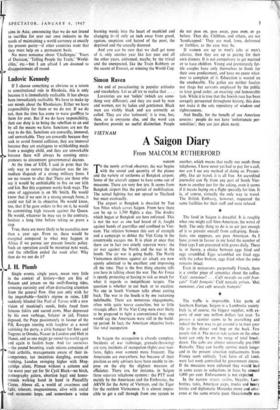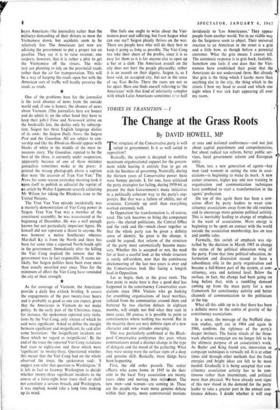A Saigon Diary
VIETNAM From MALCOLM RUTHERFORD
SAIGON
with the sound and quantity of the planes the newly arrived observer, the war begins and the variety of uniforms at Bangkok airport. Some of the aircraft appear to have come out of museums. There are very few jets. It seems from Bangkok airport like the period of mobilisation. The actual fighting has not spread to Thailand but must eventually.
The airport at Bangkok is dwarfed by Tan Son Nhut which serves Saigon. From here there can be up to 1,706 flights a day. The doubts which began at Bangkok are here enforced. This is not the war as one had heard of it, fought against bands of guerrillas and confined to Viet- nam. The relation between this sort of strength and a campaign to defeat the Viet Cong in the countryside escapes me. It is plain at once that there are in fact two utterly separate wars: the air war against the North and the war in the South. The air war is going badly. The North Vietnamese defences against air attack are now openly admitted to be excellent and improving all the time. That is the first thing anyone tells you here in talking about the war. The Air Force is openly protesting at having to risk so much for what it regards as insignificant targets. The question is whether to cut back or to escalate. No one in South Vietnam talks about cutting back. The war in the South is by my reckoning indefinable. There are numerous engagements, often with quite heavy casualties, but to little strategic effect. If the Viet Cong were ever likely to be prepared to fight a conventional war, one would say the Americans were still in the build- up period. In fact, the American objective looks like total occupation.
In Saigon the occupation is already complete. Incidents of war (sabotage, grenade-throwing) are rare, incidents of occupation (fights over taxi- fares, fights over women) more frequent. The Americans are everywhere, but because of their position as only advisers have been unable to im- pose on the city the slightest measure of efficiency. There are, for instance, in Saigon three separate telephone systems: the PTT used mainly by the Americans and the Embassies, the ARVN for the Army of Vietnam, and the Tiger for the resident Vietnamese. It is almost impos- sible to get a call through from one system to another, which means that really one needs three telephones. I have never yet had to pay for a call, nor can I see any method of doing so. Presum- ably, like air travel, it is all free. An accredited journalist can fly from any part of South Viet- nam to another just for the asking, even it seems if it means laying on a flight specially for him. It is, of course, virtually the only way to traveL The British Embassy, however, requested the same facilities for their staff and were refused.
* The food in Saigon is dreadful. It is roughly what one might call Sino-American, the worst of both. The only thing to do is to eat just enough of it to prevent oneself from collapsing. Break- fasts, one supposes, are pure American. As I have grown in favour in my hotel the number of fried eggs I am presented with grows daily. There is, in theory, a choice between eggs fried and eggs scrambled. Eggs scrambled are fried eggs with the yokes broken, eggs fried when the yoke remains intact.
Even in restaurants purportedly French, there is a similar piece of semantics about the coffee. `Café, monsieur? . . . Café nescafe ou café fran- cais?' Café francais.' Cafe nescafe arrives. 'Out, monsieur, c'est cafe nescafe francais.'
* The traffic is impossible. Like parts of Southern Europe, Saigon is a Lambretta society. Italy is, of course, the biggest supplier, with ex- ports of over one million dollars last year. To possess a scooter seems to be everything and indeed the best way to get around is to trust your life to the driver and hop on the back. Few people risk it. The motor taxi system on the other hand can only be on the verge of total break- down. The cabs are almost universally pre-1960 Renaults. They can hardly survive much longer and in the present situation replacements from France seem unlikely. Taxi fares of all kinds were last week controlled by government decree. If the measures were enforced they would lead in some cases to reductions in fares by around 1,000 per cent. Enforcement is not expected.
In the narrow streets cyclos, bicycles, Lam- brettas, taxis, American jeeps, trucks and heavy lorries and diplomatic Mercedes move and criss- cross at the same erratic pace. Occasionally one
bears Americans (the journalists rather than the military) demanding of their drivers to mow the Vietnamese down, but accidents seem to be relatively few. The Americans just now are advising the government to put a proper tax on gasoline. They say it is to raise revenue; one suspects, however, that it is rather a ploy to get the Vietnamese off the streets. The mili- tary are planning to rely on the provincial roads rather than the air for transportation. This will be a way of keeping the roads open but with the American sort of traffic will hardly preserve the roads as roads.
One of the problems here for the journalist is the total absence of news from the outside world and, if one is honest, the absence of news about Vietnam. (The journalists here are honest and do admit it; on the other hand they have to keep their jobs.) Time and Newsweek arrive on the bookstalls late, the dailies only by subscrip- tion. Saigon has three English language dailies of its own: the Saigon Daily News, the Saigon Post and the Guardian. All are subject to cen- sorship and like the Rhodesia Herald appear with blocks of white in the middle of the most in- nocuous story. The Guardian, reputed to be the best of the three, is currently under suspension, apparently because of one of those mistakes journalists sometimes make at the press: it printed the wrong photograph above a caption that went 'the assassin of Tran Van Van.' The News for some reason yesterday morning took it Vpon itself to publish as editorial the reprint of an article by Walter Lippmann severely criticising Mr Wilson for taking the Rhodesia issue to the United Nations.
The Tran Van Van episode incidentally was a masterly demonstration of Viet Cong power in Saigon. Tran Van Van was a member of the constituent assembly; he was assassinated at the beginning of December. He was a well enough known but not particularly important figure. He himself did not represent a threat to anyone. He was however a native Southerner whereas Marshall Ky is from the North and there has been for some time a reported North-South split in the government. Immediately after the killing the Viet Cong inspired the rumour that the government was in fact responsible. It seems un- likely, but Saigon politics have been even more than usually unsettled ever since. Thus for the minimum of effort the Viet Cong have reminded the city of their strength.
As for coverage of Vietnam, the Americans provide a daily five o'clock briefing. It covers the engagements of the past twenty-four hours and is probably as good as one can expect, given that the Americans in Vietnam do not make policy. In the early part of the Christmas truce, for instance, the spokesman reported sixty viola- tions by the Viet Cong, only sixteen of which he said were significant. Asked to define the margin between significant and insignificant, he said after some hesitation : 'the insignificant incidents are those which we regard as insignificant.' By the end of the truce the reported Viet Cong violations had risen to eighty-one and those which were `significant' to twenty-three. Questioned whether this meant that the Viet Cong had on the whole observed the truce, the spokesman said: 'I suggest you refer that question to Washington.' It is left in fact to faraway Washington to decide whether twenty-three significant incidents in the course of a forty-eight hour truce shall or shall not constitute a serious breach, and Washington, it was implied, would take a long time making up its mind.
One feels one ought to write about the Viet- namese poor and suffering, but from Saigon what can one say? Saigon plainly thrives on the war. There are people here who will do their best to keep it going as long as possible. The Viet Cong too take their share of the profits, since it is as easy for them as it is for anyone else to open up a bar or a club. The American assault on the city does not hurt the people physically; rather it is an assault on their dignity. Saigon is, as I have said, an occupied city, but not in the sense of say East Berlin. There the races are not so far apart. Here one finds oneself referring to 'the Americans' with that kind of inferiority complex with which Latin Americans sometimes refer half
invidiously to `Los Americans.' They appear people from another world. Yet in no visible way do the Saigonese seem to object. Their universal reaction to an American in the street is a grin and a little bow, as though before a potential customer. What the grin means I cannot tell. The automatic response is to grin back, foolishly. Somehow one feels if one does that the Viet- namese have established their point that the Americans do not understand them. But already that grin is the thing which I loathe more than anything else in the city, the thing which in the streets I bow my head to avoid and which one night when I was sick kept appearing all over my room.































 Previous page
Previous page